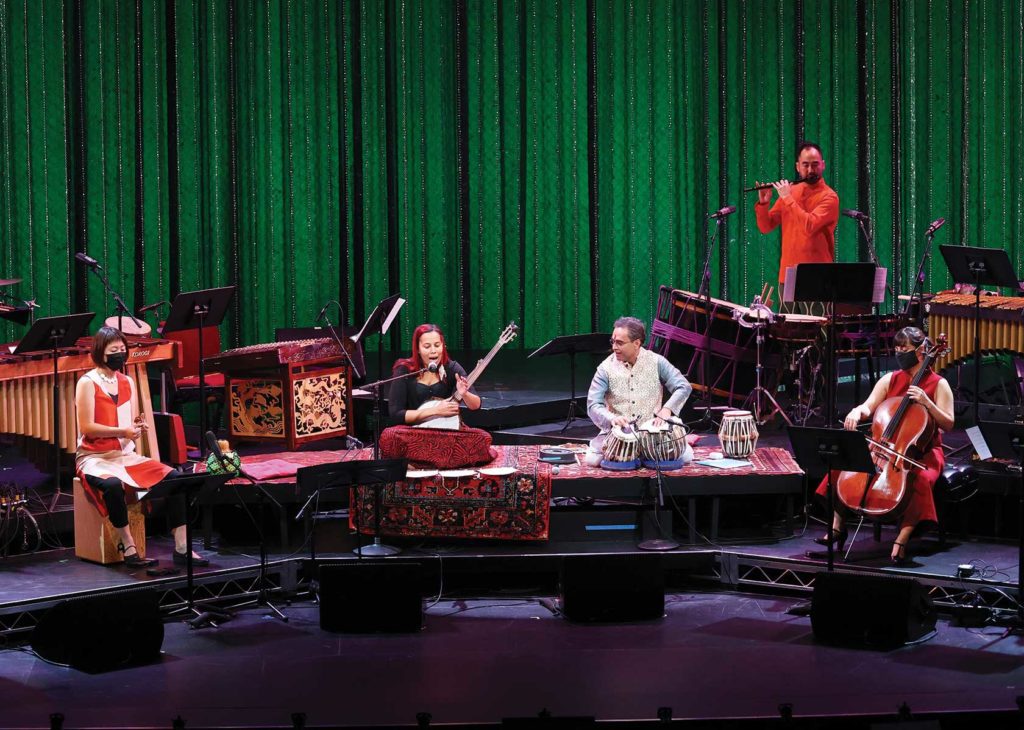A musical rebirth from Silkroad Ensemble
‘Phoenix Rising’ marks debut of artistic director Rhiannon Giddens

The Silkroad Ensemble, led from 1998 to 2017 by its founder, cellist Yo-Yo Ma, staged its post-pandemic rebirth Friday night with a sold-out concert at the Loeb Drama Center in Harvard Square.
Presented by the American Repertory Theater, the concert, the first of three performances last weekend, was Silkroad’s debut with its new artistic director, Rhiannon Giddens.

Silkroad premieres “Phoenix Rising” at American Repertory Theater in Cambridge. PHOTO: NOIR PRISM/RICH WOODS
A natural as Ma’s successor, Giddens, 44, is a virtuoso musician drawn to exploring overlooked voices and histories embedded in musical traditions. A MacArthur “Genius Grant” recipient, Giddens was co-founder and lead singer of the Carolina Chocolate Drops, an old-time string band that mines the African American origins of country music.
The concert was also the premiere of Silkroad’s latest program, “Phoenix Rising,” named for the mythical bird that symbolizes rebirth. Performed by 16 musicians, including Giddens, the 90-minute program presented fresh arrangements of selections from the ensemble’s repertoire as well as new works.
Giddens began the spellbinding evening with her gospel-infused delivery of “O, Death,” a traditional Appalachian hymn, accompanied by the ensemble. She followed with “Omoide” (Memories), a 2006 song by Tsunekichi Suzuki, which she sang in Japanese.
Artful staging evoked the phoenix, which, consumed by flame, rises reborn from its ashes. Drawings of the bird by Kevork Mourad flanked the stage. Projections of Mourad’s semiabstract images formed a backdrop, alternating with columns of colored lights.
Arranged in a semicircle was an array of instruments seldom onstage together, from basses, violins and a viola to a Persian kamancheh with a bowl-shaped body and slender neck, and a yangqin, a trapezoidal Chinese hammered dulcimer.
Bringing all these tools to life were the musicians, their moving fingers, arms and bodies creating layered waves of harmony and churning rhythmic currents in which threads of a raga mingled with low moans of violins. A Celtic harp stroked by Maeve Gilchrist yielded angelic tones. Wu Man released gales of notes as she rapidly combed the strings of her lute-like Chinese pipa. With their manual music-making so fully on display, the musicians did not seem so very far from the world of scraping washboards and finger-picking banjo licks of an old-time country band as they served up one delicacy after another, including many surprises.
Seated like a traditional sitar player alongside Sandeep Das as he thrummed his tabla, Giddens played her banjo and sang “Ekla Cholo Re,” a hymn to resilience by Nobelist Rabindranath Tagore, in its original Bengali.
Two interludes were performed by a pair of storytellers: Nora Fischer with words, and Preeti Vasudevan with dance. They acknowledged with stunning directness the emotional toll of the pandemic, evoking with spare language and movement the death of a father; the frenzy of social pop-ups; and the prolonged isolation.
Giddens concluded the evening with a litany of thank-you callouts. After the ensemble performed a rousing finale, Giddens announced that there was yet another person to thank: Yo-Yo Ma. Silkroad’s founder came to the stage with his cello and performed an exquisite solo to honor the debut of what he described as “Silkroad 3.0.”
Then, the ensemble played once more, and with pauses and leaps, Vasudevan marked the rhythmic undercurrents of the surging, euphoric finale.






